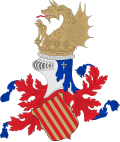Quart de les Valls | |
|---|---|
 | |
| Coordinates: 39°44′28″N0°16′17″W / 39.74111°N 0.27139°W | |
| Country | |
| Autonomous community | |
| Province | Valencia |
| Comarca | Camp de Morvedre |
| Judicial district | Sagunto |
| Government | |
| • Alcalde | José Sevilla Los Santos |
| Area | |
• Total | 8.4 km2 (3.2 sq mi) |
| Elevation | 29 m (95 ft) |
| Population (2025-01-01) [1] | |
• Total | 1,029 |
| • Density | 120/km2 (320/sq mi) |
| Demonym(s) | Quarter, quartera |
| Time zone | UTC+1 (CET) |
| • Summer (DST) | UTC+2 (CEST) |
| Postal code | 46510 |
| Official language(s) | Valencian |
| Website | Official website |
Quart de les Valls is a municipality in the comarca of Camp de Morvedre in the Valencian Community, Spain.



